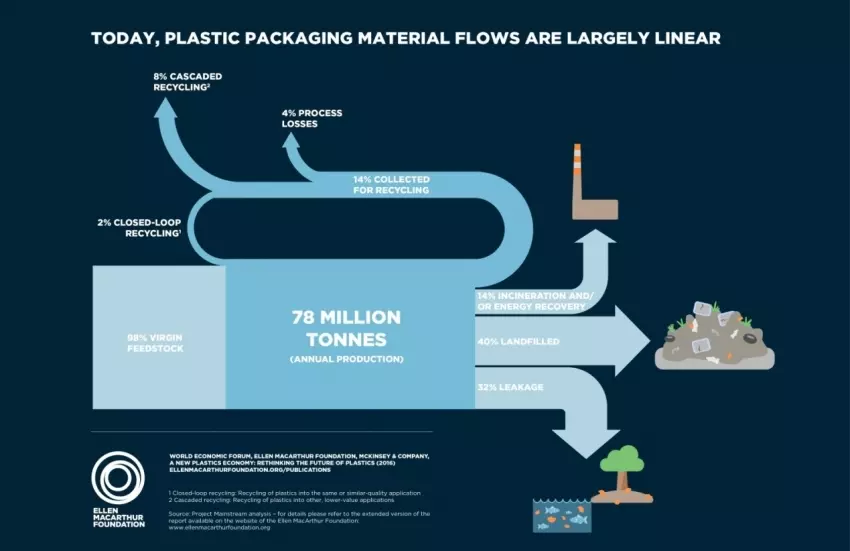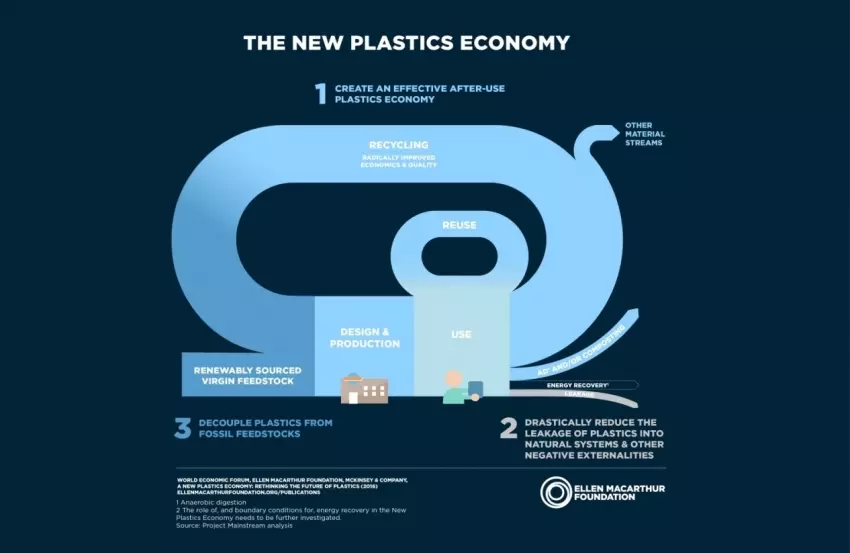Veolia has joined the New Plastics Economy initiative, which is led by the Ellen MacArthur Foundation, as a Core Partner. The New Plastics Economy is an ambitious, three-year initiative to build momentum towards a plastics system that works. Applying the principles of the circular economy, the initiative brings together leading companies, cities, philanthropists, policymakers, academics, students, NGOs, and citizens to re-think and re-design the future of plastics, starting with packaging.
The initiative builds on the recommendations of the report ‘The New Plastics Economy: Rethinking the future of plastics’ issued by the Ellen MacArthur Foundation and World Economic Forum, at the Annual Meeting in Davos in January 2016. The report provided the first comprehensive view of the global plastic packaging value chain, highlighting its contributions but also revealing significant drawbacks. With material value loss running at $80-120 billion a year in the industry and negative environmental externalities costing at least $40 billion a year – a figure greater than the plastic packaging industry’s profit pool – the opportunity for the global economy of transforming the system is clear. The New Plastics Economy initiative takes a concrete first step towards the design of a plastics system grounded in circular economy principles.
“This new initiative is set up for three years, reflecting the scale of the challenge to mobilise over time a fundamental, system wide transformation. It seeks to create a shared sense of direction, to spark a new wave of innovation and to move the plastics value chain – starting with plastic packaging – into a positive spiral of value capture, stronger economics, and better environmental outcomes. We are delighted to have Veolia, with its resource management expertise, join as a Core Partner of the initiative” said Dame Ellen MacArthur.
As a Core Partner, Veolia will contribute to shaping the work programme and selecting the projects and pilots, through participation in the advisory board. Veolia looks forward to working with this unique group of stakeholders from across the global plastics value chain on select workstreams and innovation projects.
"It will take a concerted effort involving various stakeholders to make the systemic changes needed to transitionto a circular economy", said Antoine Frérot, Chairman and CEO of Veolia. "This is especially true for plastics. Veolia believes that the New Plastics Economy initiative provides an excellent platform for this collaboration".
Veolia believes that the New Plastics Economy initiative provides an excellent platform for this collaboration
With an explicitly systemic and collaborative approach, the New Plastics Economy initiative focuses on five interlinked and mutually reinforcing building blocks:
- Dialogue mechanism: Bringing together for the first time a group of leading companies and cities across the global value chain to complete collaborative demonstration projects and inform the other building blocks
- Global Plastics Protocol: Rethinking plastic packaging materials, formats and after-use systems and standards to provide a common target state to innovate towards, to overcome existing fragmentation and enable the creation of effective markets
- Innovation moonshots: Mobilising targeted innovations that can scale across the system, to redefine what’s possible and create the conditions for a new economy
- Evidence base: Closing critical knowledge gaps by building an economic and scientific evidence base from which to draw insights
- Outreach: Engaging a broad set of stakeholders, including citizens, educators, students, policymakers, NGOs, and industry associations in the redesign of a better system.



